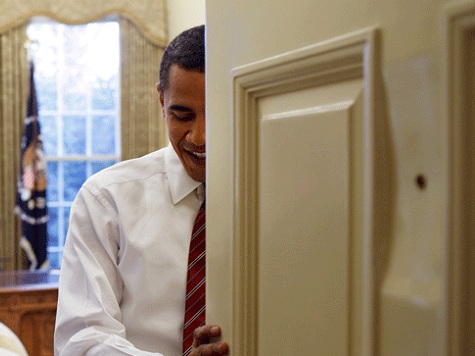
As more information comes to the light about the Obama administration’s Benghazi cover-up, a former Navy SEAL officer who once took a military detachment to Libya suggests President Barack Obama was either AWOL — essentially an “empty chair” — or deliberately denied Americans under siege in Benghazi the aid they needed by not authorizing “cross-border authority,” without which rescue operations could have taken place.
Matt Bracken, the former SEAL, writes “only the president can give the order for our military to cross a nation’s border without that nation’s permission.” He notes that Obama granted “cross-border authority” for Americans to enter Pakistani airspace to take out Osama bin Laden but, “in order to prevent a military rescue in Benghazi,” all Obama had to do was not grant the authority and any rescue missions would not have been able to go forward without the CBA.
As soon as terrorists attacked the U.S. consulate in Libya, dozens of headquarters — including AFRICOM and EUROCOM — are notified so they can begin their planning for rescue operations, but, as Braken writes, “there is one thing they can’t do without explicit orders from the president: cross an international border on a hostile mission.”
Had Obama issued the order, Bracken says records would exist and could be immediately provided:
We can be 100% certain that cross-border authority was never given. How do I know this? Because if CBA was granted and the rescue mission execute orders were handed down, irrefutable records exist today in at least a dozen involved component commands, and probably many more. No general or admiral will risk being hung out to dry for undertaking a mission-gone-wrong that the POTUS later disavows ordering, and instead blames on “loose cannons” or “rogue officers” exceeding their authority. No general or admiral will order U.S. armed forces to cross an international border on a hostile mission unless and until he is certain that the National Command Authority, in the person of the POTUS and his chain of command, has clearly and explicitly given that order: verbally at the outset, but thereafter in written orders and official messages. If they exist, they could be produced today.
General David Petraeus has said the stand-down order did not come from the CIA and, as Bracken notes, “only the national security team at the White House” outranks the CIA.
The CBA is a “clear red line” and, as Bracken notes, had Obama and his national security team decided not to “go the military action route, the case would have been closed.” But 90 minutes after the Benghazi attacks, Obama ordered military assets to be moved into the region for “contingency situations” but most likely decided not to intervene militarily. In fact, the State Department did not ask for military backup, as was reported, giving more credence to Bracken’s suggestion.
As Braken notes, Obama most likely issued damage control standing orders such as, “We should do what we can to help them … but no military intervention from outside of Libya.”
Since “nobody in the chain of command below President Obama can countermand his ‘standing orders,'” those orders would be left in place if Obama, as Bracken suggests, “goes upstairs to the family quarters, or otherwise makes himself ‘unavailable.'” And the orders will continue “to stand until” Obama — and Obama alone — changes them.
Obama never did.
Bracken says another possibility would be Obama left “no outside military intervention, no cross-border authority” orders, but the point is, even after the the White House received e-mails immediately following the attack notifying them that terrorists were responsible for the chaos, Obama dithered — monitoring the situation to see if it would get worse in an attempt to limit the potential political fallout from whatever action — if any — he was considering taking.
And as Obama was deliberating and pontificating — and denying requests from SEALs, CIA officials, and Americans in Libya for immediate help — instead of acting to save American lives in Libya, U.S. Ambassador Chris Stevens and three others were murdered.
Americans on the ground were ready and able to help Stevens and the other Americans who were under siege in Libya, but Obama never gave them the “cross-border authority” required for them to do so, which meant U.S. resources stationed on the ground in the region — and U.S. drones and gunships in the area — were never used.

COMMENTS
Please let us know if you're having issues with commenting.